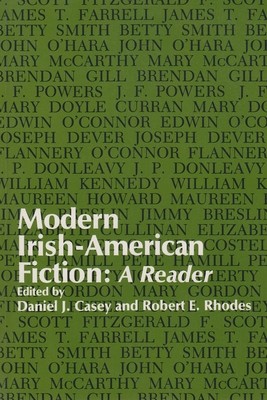
- We will send in 10–14 business days.
- Publisher: Syracuse University Publications in Continuing Education
- ISBN-10: 0815602340
- ISBN-13: 9780815602347
- Format: 16.3 x 23.8 x 4.6 cm, minkšti viršeliai
- Language: English
- SAVE -10% with code: EXTRA
Modern Irish-American Fiction (e-book) (used book) | bookbook.eu
Reviews
Description
Reflected in these writings from twenty-one Irish Americans are the themes common to all immigrant literature, but from the authors' own ethnic point of view. The struggle for success forms the underlying structure in the stories by O'Hara, Curran, and McCarthy; and the changing values the New World imposes on the individual are seen in Edwin O'Connor's "Grand Day for Mr. Garvey."
Irish wit and black humor pepper all the stories, as represented by Dunn's bartender-philosopher, "Dooley," and Donleavy's "Fairy Tale of New York." Catholicism is omnipresent and is often characterized by the priest, as in Fitzgerald's "Benediction," Power's "Bill," and Flaherty's Fogarty. Themes that have an immense effect on the characters' relationships are their difficulties in communicating with one another, which Gill captures succinctly in "The Cemetery," and the repositioning of gender roles, so evident in Cullinan's "Life After Death" and in Costello's "Murphy's Xmas."
Finally, there are the intense, often contradictory, feelings the characters have toward their "homeland" Hamill's Gift illustrates the desire to rid Ireland of British rule; Gordon's "neighborhood" shows the immigrants' embarrassment over their origins.
Editors Casey and Rhodes have organized these pieces chronologically, beginning at the turn of the century. Thus, the selections illustrate the progression of Irish-American literature and also fulfill the word of William Kennedy, who said of his own writing: "those who came before helped to show me how to turn experience into literature."
EXTRA 10 % discount with code: EXTRA
The promotion ends in 23d.05:21:51
The discount code is valid when purchasing from 10 €. Discounts do not stack.
- Publisher: Syracuse University Publications in Continuing Education
- ISBN-10: 0815602340
- ISBN-13: 9780815602347
- Format: 16.3 x 23.8 x 4.6 cm, minkšti viršeliai
- Language: English English
Reflected in these writings from twenty-one Irish Americans are the themes common to all immigrant literature, but from the authors' own ethnic point of view. The struggle for success forms the underlying structure in the stories by O'Hara, Curran, and McCarthy; and the changing values the New World imposes on the individual are seen in Edwin O'Connor's "Grand Day for Mr. Garvey."
Irish wit and black humor pepper all the stories, as represented by Dunn's bartender-philosopher, "Dooley," and Donleavy's "Fairy Tale of New York." Catholicism is omnipresent and is often characterized by the priest, as in Fitzgerald's "Benediction," Power's "Bill," and Flaherty's Fogarty. Themes that have an immense effect on the characters' relationships are their difficulties in communicating with one another, which Gill captures succinctly in "The Cemetery," and the repositioning of gender roles, so evident in Cullinan's "Life After Death" and in Costello's "Murphy's Xmas."
Finally, there are the intense, often contradictory, feelings the characters have toward their "homeland" Hamill's Gift illustrates the desire to rid Ireland of British rule; Gordon's "neighborhood" shows the immigrants' embarrassment over their origins.
Editors Casey and Rhodes have organized these pieces chronologically, beginning at the turn of the century. Thus, the selections illustrate the progression of Irish-American literature and also fulfill the word of William Kennedy, who said of his own writing: "those who came before helped to show me how to turn experience into literature."


Reviews